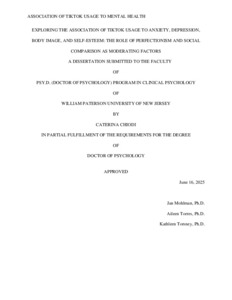Please use this identifier to cite or link to this item:
http://hdl.handle.net/20.500.12164/3500Full metadata record
| DC Field | Value | Language |
|---|---|---|
| dc.contributor.author | Chiodi, Caterina | - |
| dc.date.accessioned | 2025-07-16T11:54:29Z | - |
| dc.date.available | 2025-07-16T11:54:29Z | - |
| dc.date.issued | 2025-07-01 | - |
| dc.identifier.uri | http://hdl.handle.net/20.500.12164/3500 | - |
| dc.description.abstract | Since its inception, social media has largely been characterized as maladaptive for its users. Limited empirical research exists investigating the psychological implications of newer platforms such as TikTok, characterized by short videos which comprise the majority of its content. The present study examined the association between TikTok usage and mental health symptoms among 114 undergraduate students, a relevant population due to the platform’s popularity in this demographic subgroup. Based on existing literature on social media and mental health, the study sought to determine whether frequency of TikTok usage would show an association with symptoms of distress, body image disturbance, and self-esteem problems. It was hypothesized that frequency of TikTok usage would be significantly and positively correlated with symptoms of psychological distress (i.e., symptoms of anxiety and depression), body image disturbance, and self-esteem problems. Results showed that TikTok usage was indeed significantly and positively associated with distress, but not body image disturbance or self-esteem problems. Additionally, based on existing literature, it was hypothesized that perfectionism and social comparison would each significantly moderate the relationship between TikTok usage and distress, body image disturbance and self-esteem problems. More specifically, it was expected that higher perfectionism and social comparison scores would be associated with an even stronger positive association of TikTok use and outcome measures. Contrary to predictions, neither social comparison nor perfectionism moderated any of the relationships with TikTok usage, although both showed significant bivariate relations with some outcome measures. This study underscores the relevance of evaluating reduction in the use of TikTok as a means of possibly lowering distress among college students, and vice versa. | en_US |
| dc.format.extent | 34 pages | en_US |
| dc.language.iso | en_US | en_US |
| dc.publisher | William Paterson University | en_US |
| dc.subject | Psychology | en_US |
| dc.subject | Distress | en_US |
| dc.subject | Perfectionism | en_US |
| dc.subject | Social comparison | en_US |
| dc.subject | Social media | en_US |
| dc.subject | TikTok | en_US |
| dc.subject.lcsh | Psychology | en_US |
| dc.title | Exploring the Association of TikTok Usage to Anxiety, Depression, Body Image, and Self-Esteem: The Role of Perfectionism and Social Comparison as Moderating Factors | en_US |
| dc.type | Dissertation | en_US |
| Appears in Collections: | Theses & Dissertations | |
Files in This Item:
| File | Description | Size | Format | |
|---|---|---|---|---|
| Chiodi_TikTokMentalHealth.pdf | 383.55 kB | Adobe PDF |  View/Open |
Items in DSpace are protected by copyright, with all rights reserved, unless otherwise indicated.
